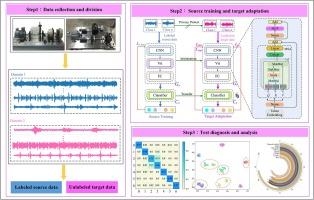SFDA-T: A novel source-free domain adaptation method with strong generalization ability for fault diagnosis
IF 8
1区 工程技术
Q1 COMPUTER SCIENCE, ARTIFICIAL INTELLIGENCE
引用次数: 0
Abstract
Currently, source free domain adaptation (SFDA) methods are employed to address the issue of inaccessible source domain data (SDD) in transfer learning. However, existing SFDA methods often suffer from overfitting to specific domains, leading to poor generalization ability in the target domain. To address these challenges, this paper proposes a novel SFDA method named SFDA-T for fault diagnosis. Specifically, a Transformer-CNN-based feature extractor is constructed, to mine the transferable feature knowledge of faults in the SDD. The approach reduces the overfitting of the model to domain-specific information and improves model’s generalization ability. In addition, the feature attention loss is designed to calculate attention weights of the sample features to increase the model’s attention to the crucial feature regions in the target domain. A source similarity guided exponential loss is developed to guide target samples based on the decision boundaries of the source domain, facilitating cluster alignment of target sample categories and expanding distances between different categories. Furthermore, a self-training pseudo-labeling constraint is employed to reduce the effect of incorrect label matching and further constrain the model. The results of the experiments on gearboxes and bearings indicate that the proposed method achieves high fault diagnosis accuracy while effectively decoupling from SDD.

SFDA-T:用于故障诊断的具有强大泛化能力的新型无源域适应方法
目前,无源域适应(SFDA)方法被用于解决迁移学习中无法获取源域数据(SDD)的问题。然而,现有的 SFDA 方法往往存在对特定领域过度拟合的问题,导致在目标领域的泛化能力较差。为了应对这些挑战,本文提出了一种用于故障诊断的新型 SFDA 方法,命名为 SFDA-T。具体来说,本文构建了一种基于变换器-CNN 的特征提取器,以挖掘 SDD 中故障的可迁移特征知识。该方法减少了模型对特定领域信息的过度拟合,提高了模型的泛化能力。此外,还设计了特征关注度损失来计算样本特征的关注度权重,以提高模型对目标域中关键特征区域的关注度。开发了源相似性引导指数损失,以根据源域的决策边界来引导目标样本,从而促进目标样本类别的聚类对齐,并扩大不同类别之间的距离。此外,还采用了自训练伪标签约束来减少错误标签匹配的影响,并进一步约束模型。在齿轮箱和轴承上的实验结果表明,所提出的方法在有效地与 SDD 解耦的同时,还实现了较高的故障诊断精度。
本文章由计算机程序翻译,如有差异,请以英文原文为准。
求助全文
约1分钟内获得全文
求助全文
来源期刊

Advanced Engineering Informatics
工程技术-工程:综合
CiteScore
12.40
自引率
18.20%
发文量
292
审稿时长
45 days
期刊介绍:
Advanced Engineering Informatics is an international Journal that solicits research papers with an emphasis on 'knowledge' and 'engineering applications'. The Journal seeks original papers that report progress in applying methods of engineering informatics. These papers should have engineering relevance and help provide a scientific base for more reliable, spontaneous, and creative engineering decision-making. Additionally, papers should demonstrate the science of supporting knowledge-intensive engineering tasks and validate the generality, power, and scalability of new methods through rigorous evaluation, preferably both qualitatively and quantitatively. Abstracting and indexing for Advanced Engineering Informatics include Science Citation Index Expanded, Scopus and INSPEC.
 求助内容:
求助内容: 应助结果提醒方式:
应助结果提醒方式:


